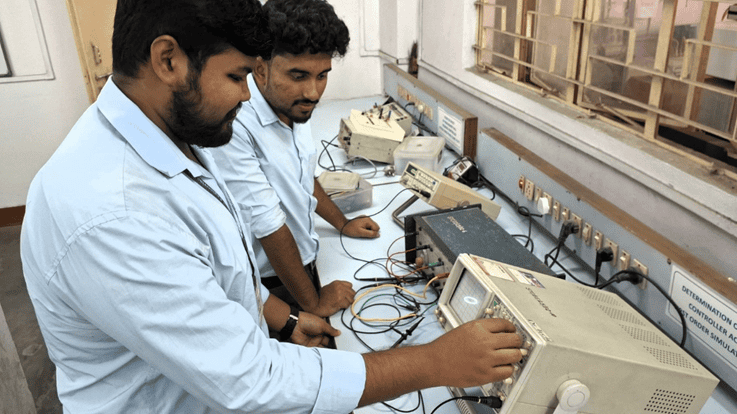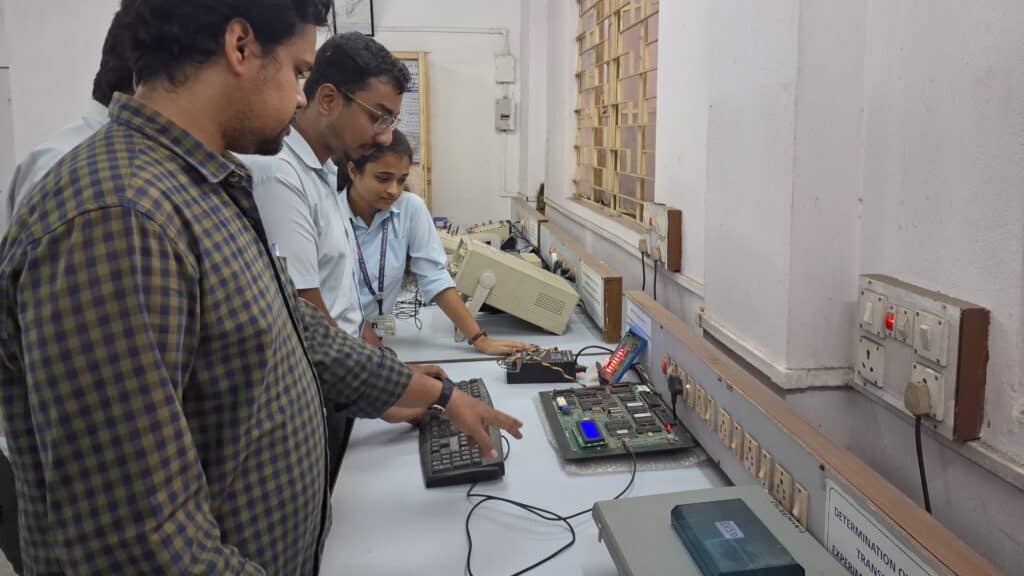Laboratories
The Department of Electrical Engineering at St. Thomas’ College of Engineering & Technology is equipped with state-of-the-art laboratories that provide students with hands-on experience and practical exposure to complement theoretical learning. These labs are designed to strengthen students’ understanding of foundational concepts in circuits, machines, power systems, electronics, and control systems, while also enabling them to explore advanced topics such as renewable energy, electric vehicles, smart grids, and automation through research and project-based learning.
Each laboratory is maintained with modern equipment, simulation software, internet access, projection systems, and LAN connectivity. A faculty-in-charge and dedicated technical staff ensure smooth operation and student support. The department actively encourages innovation, research, and interdisciplinary project work beyond the curriculum.The Electrical Engineering Department houses the following laboratories:
Basic Electrical Engineering Laboratory

This lab provides students with a foundational understanding of electrical engineering by conducting experiments related to Ohm’s law, Kirchhoff’s laws, and basic circuit theorems. It includes experiments on both DC and AC circuits, measurements of electrical quantities, and introduction to electrical machines such as transformers and motors. The lab builds essential skills for analyzing electrical networks
Electric Circuit Laboratory

Students use this laboratory to analyze electrical networks through experiments involving network theorems, resonance, filters, and two-port networks. The lab is equipped with function generators, oscilloscopes, multimeters, and circuit simulation software. It also facilitates the study of transient and steady-state responses, as well as Fourier and Laplace-based circuit analysis, reinforcing strong analytical foundations.
Electric Machines Laboratory

This laboratory provides in-depth knowledge of electrical machines such as DC motors, synchronous machines, transformers, and induction motors. Students perform experiments on load testing, speed control, and efficiency analysis. It focuses on machine characteristics, practical applications, and industrial energy conversion practices, making it vital for those pursuing careers in electrical and industrial engineering.
Electrical and Electronic Measurement Laboratory

This lab focuses on measurement techniques and instrumentation principles essential for both electrical and non-electrical quantities. Equipped with digital and analog instruments, transducers, and sensors, students learn calibration, accuracy, and error analysis. Emphasis is placed on developing precision and reliability in data acquisition, measurement systems, and industrial instrumentation.
Power System Laboratory

This lab helps students understand the operational and safety aspects of modern power systems. Experiments include fault analysis, relay coordination, transmission line modeling, and load flow studies. The lab is equipped with relay testing kits, fault simulators, and miniature transmission systems, allowing students to simulate real-world grid scenarios and protection schemes.
Control System Laboratory

Students explore automation, feedback systems, and control theory through experiments involving PID controllers, servo motors, and motor control setups. The lab bridges the gap between mathematical modeling and practical implementation. It emphasizes stability analysis, time and frequency response, and the use of simulation software for control system design in industrial automation.
Power Electronics Laboratory

This lab introduces students to power semiconductor devices such as IGBTs, MOSFETs, and SCRs, and their applications in converters, inverters, choppers, and rectifiers. It emphasizes design and analysis of power converters, switching characteristics, and control of electrical drives. The lab is essential for understanding energy-efficient systems and renewable energy interface technologies.
Microprocessor & Microcontroller Laboratory

This lab enables students to develop embedded systems using modern microprocessors and microcontrollers They learn assembly-level programming, interfacing techniques, and real-time control applications. It forms the basis for projects in automation, robotics, IoT, and smart system design, blending hardware and software skills.
Electrical Drives Laboratory

This laboratory focuses on the study and performance analysis of electrical drives used in industry. Students experiment with DC and AC drives, analyze torque-speed characteristics, and implement different speed control methods using controllers. The lab prepares students for real-world applications in automation, traction, electric vehicles, and energy-efficient motor operations.
Thermal Power Engineering Laboratory
Dedicated to understanding energy conversion through conventional and renewable thermal processes, this lab includes setups for studying steam turbines, internal combustion engines, and combined cycles. It also integrates solar thermal and wind energy modules. Students gain insights into energy efficiency, thermal cycles, and sustainable power generation systems.
Simulation Laboratory

Equipped with advanced software tools such as MATLAB/Simulink, PSIM, ETAP, PSCAD, Arduino IDE, KEIL, and Dev C++, this lab supports modeling and simulation across various electrical engineering domains. Students perform virtual experiments, simulate machine and power system behaviors, and develop control algorithms. It also enhances programming, numerical methods, and system-level analysis capabilities.
Research & Development Laboratory

This lab fosters innovation through interdisciplinary research projects in areas like smart grids, renewable energy integration, electric vehicles, AI, and IoT. With advanced computing resources, prototyping kits, and simulation tools, students and faculty collaborate on funded research and publish findings in reputed journals. The lab encourages creativity, teamwork, and problem-solving through experimentation.
Project Laboratory

The Project Laboratory is dedicated to supporting final-year and interdisciplinary projects undertaken by students. It offers facilities for design, simulation, prototyping, and testing of real-world applications. Equipped with hardware kits, testing tools, and advanced software, the lab promotes innovation, entrepreneurship, and hands-on product development aligned with industry needs and academic research goals.

